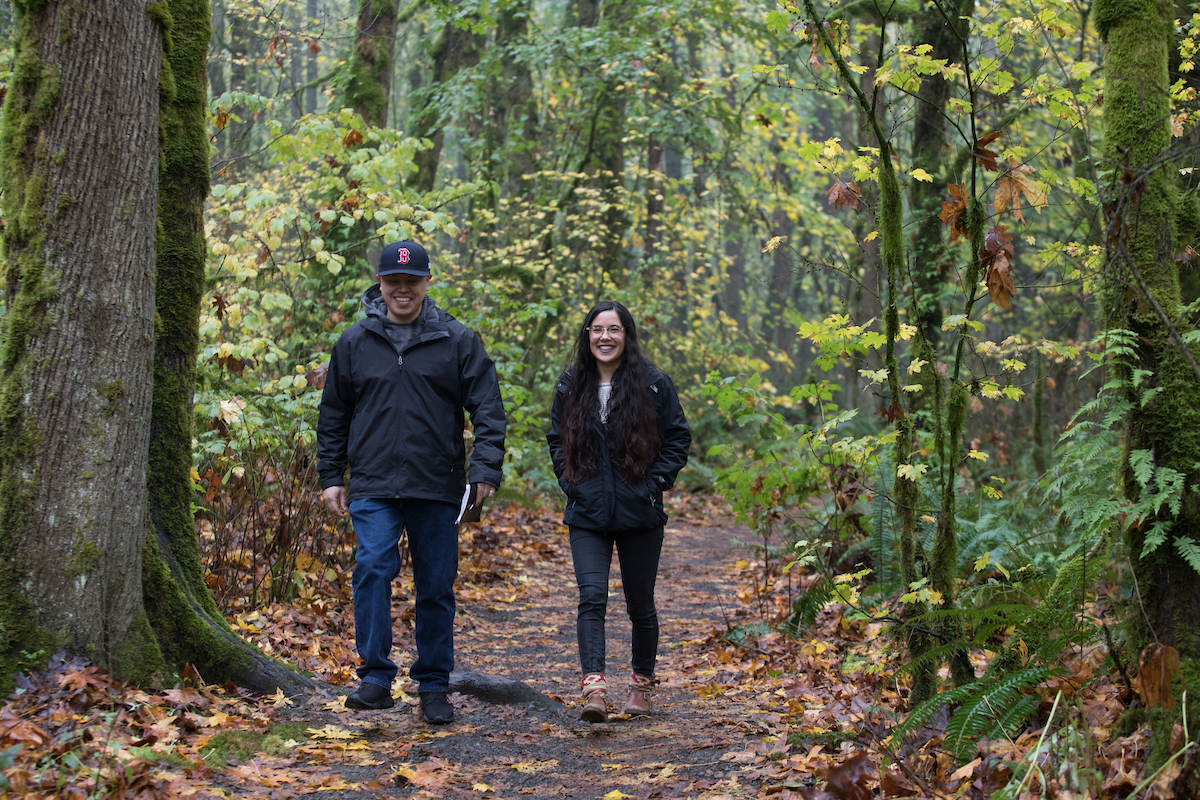Tryon Creek: Cultural And Ecological Education (Pre-2020)
Students will participate in interpretive programs facilitated within the Tryon Creek State Natural Area.

It is important to ground ourselves and acknowledge the people whose land we are utilizing; the
Clackamas Chinook, the Wasco-Wishram, the Willamette Tumwater, the Multnomah, and other
Chinookan peoples, as well as the Tualatin Kalapuya, the Cayuse, the Molalla and other tribes and bands
of the Columbia and Willamette Rivers. It is important to acknowledge the original inhabitants of the
land now known as Tryon Creek State Natural Area, and to recognize that we are here because of the
sacrifices that were forced upon them. We also remember that we are guests of this land and must do
our best to honor the original peoples, through authentic cultural narratives and continued stewardship
of the water, the land, and plants that make up this forest community. To follow our acknowledgement
with action, we will continue to use our resources to prioritize partnerships with Indigenous tribes, tribal
governments, and inter-tribal organizations.
Community-based work will focus on the Friends of Tryon Creek (FOTC) restoration and day camp programs. Capstone students will have the opportunity to serve as Interpretive Educators for nature day campers & conduct culturally relevant restoration. Today’s youth have fewer and fewer opportunities to interact with the natural world. We are all dependent on healthy ecosystems to support life on our planet, including our own, and we are increasingly asked to examine issues involving the environment. FOTC programs are
designed to develop personal connections to the living earth and begin learning about our connections to the natural world.
Equity Statement
Friends of Tryon Creek is committed to acknowledging social justice, identity, and power structures in past and present settings through diverse perspectives. For us, this means all programs employ an equity framework, incorporating diversity trainings and workshops throughout our extended community, including board, staff and volunteer base. We seek to support our whole community in their effort to reclaim, reconnect and build relationships with the natural world. Our commitment is built and sustained through authentic partnerships with communities of color, culturally specific organizations, and other historically under-represented groups.
This course is designed to inspire and question the ways we educate both ourselves and our next seven generations, as global stewards. Through applied field experiences, classroom discussion and exercises, readings, nature journaling, and group projects; students will gain a deeper appreciation of the authentic cultural ecology of the area.
Course Opportunities and Outcomes
Capstone students will have the opportunity to:
* Work in an effective interdisciplinary collaborative group.
* Explore different approaches to education, through a cultural and ecological lens.
* Develop an understanding of outdoor and environmental education techniques.
* Relate cultural and ecological service in the natural area to broader global issues.
The above opportunities and outcomes are guided by the four Capstone Course Goals
1. Inquiry and Critical Thinking: Students will learn various modes of inquiry through interdisciplinary curricula (problem posing, investigating, conceptualizing) in order to become active and empowered learners.
2. Communication: Students will enhance their capacity to communicate in various ways (writing, graphics, and other visual and oral means) to collaborate effectively with others in group work. Communication techniques will be utilized as both informed learners and empowered teachers.
3. Diversity, Equity and Social Justice: Students will explore and analyze identity, power relationships, and social justice in historical contexts and contemporary settings from multiple perspectives.
4. Ethical Issues and Social Responsibility: Students will expand their understanding of the impact and value of individuals and their choices on society, both intellectually and socially, through group projects and collaboration in learning communities.
Required Textbooks:
• Braiding Sweetgrass: Indigenous Wisdom, Scientific Knowledge, and the Teachings of Plants. 2013. Robin Wall Kimmerer. Available in the Tryon Nature Store.
See attached syllabus for additional course requirements.
